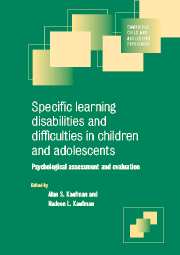 Specific Learning Disabilities and Difficulties in Children and Adolescents
Specific Learning Disabilities and Difficulties in Children and Adolescents Book contents
- Frontmatter
- Contents
- List of contributors
- Preface
- Part I History and Tradition
- 1 History lessons
- 2 The Wechsler intelligence scales
- Part II Alternative Cognitive Approaches to Learning Disabilities Assessment and Remediation
- Part III Neuropsychological Approaches to Learning Disabilities Assessment and Remediation
- Part IV Integration and Summation
- Index
1 - History lessons
from Part I - History and Tradition
Published online by Cambridge University Press: 06 January 2010
- Frontmatter
- Contents
- List of contributors
- Preface
- Part I History and Tradition
- 1 History lessons
- 2 The Wechsler intelligence scales
- Part II Alternative Cognitive Approaches to Learning Disabilities Assessment and Remediation
- Part III Neuropsychological Approaches to Learning Disabilities Assessment and Remediation
- Part IV Integration and Summation
- Index
Summary
Introduction
In April 1963, Samuel Kirk, a prominent psychologist/special educator, stood before a group composed of people whose children were in trouble in school and other people, in smaller numbers, who had a professional interest in the children, and said:
I know that one of your problems at this meeting is to find a term that applies to every child. Last night, a friend of mine accosted me with the statement, ‘We're going to ask you to give us a term’
(Kirk, 1963, p. 1).A few sentences later, Dr Kirk referred to ‘children with developmental deficits of one kind or another’ and then, after pointing out problems with ‘technical and complex labels’ and arguing for behavioral descriptions of children's problems rather than etiological statements, said:
Recently, I have used the term ‘learning disabilities’ to describe a group of children who have disorders in development in language, speech, reading and associated communication skills needed for social interaction. In this group I do not include children who have sensory handicaps such as blindness or deafness, because we have methods of managing and training the deaf and the blind. I also exclude from this group children who have generalized mental retardation. This approach has led me and my colleagues to develop methods of assessing children, or describing their communication skills in objective terms
(Kirk, 1963, pp. 2–3).- Type
- Chapter
- Information
- Specific Learning Disabilities and Difficulties in Children and AdolescentsPsychological Assessment and Evaluation, pp. 3 - 28Publisher: Cambridge University PressPrint publication year: 2001
- 6
- Cited by
